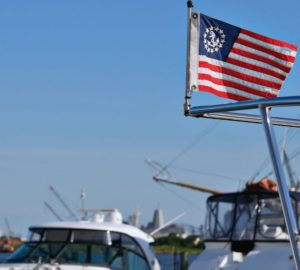If you’re looking for top quality service on your yacht, it will not happen without a high-quality crew. Smooth operations, world class food, and attentive service takes a great captain leading a crew of skilled stewards, chefs, deckhands, and engineers. Pulling that together is no simple task, and it takes a special something to get the right team together.
So how do you get a crew that runs your yacht the way you want it? There are a lot of factors that make a top-flight crew. It’s not just the skills, though they are critical. You need a team that works together, and works in line with the yacht ownership experience you want to have.
If you have a small yacht that just takes one or two people, it’s not so bad to do it yourself. But putting together a crew for a larger private or charter boat isn’t so different from staffing a small company.
So how do you get there?
What crew positions do you need?
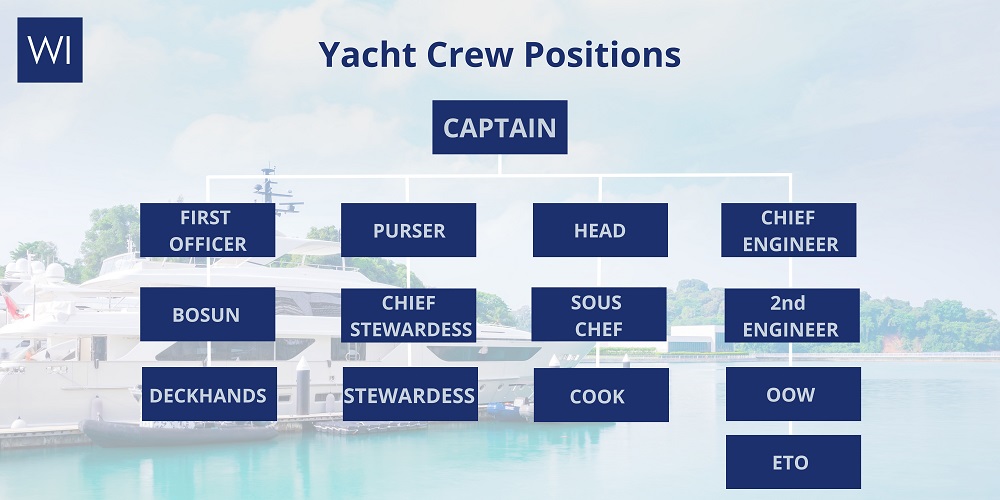
Large yachts have four departments with clearly defined areas of primary responsibility. The captain is the ultimate management authority on all matters, and all department heads report to them. There will always be overlap in crew jobs, and sometimes, different departments will help each other out and step in when needed. It’s that spirit of teamwork and cooperation that separates merely acceptable crew from the truly outstanding.
Read also: Yacht crew positions : Hierarchy, Missions & Salaries explained
The Captain
You can not run a yacht without a captain. The captain will be your primary point of contact as the yacht owner, and they will be responsible for all management decisions. The captain oversees systems upgrades, yacht operations, and crew and department management.
Finding a captain who understands you, that you work well with, is the key to getting what you want from yacht ownership. A good captain may stay with you for years, and if you find one, it’s wise to do everything you can to keep them happy.
NB: Becoming a yacht captain requires specific certifications or diplomas, but the requirements vary depending on the flag state of the yacht. This refers to the country in which the yacht is registered and each flag state has its own regulations. Here are some widely recognized certifications by flag state:
- US flag: U.S. Coast Guard issues the Master of Steam or Motor Vessels license
- UK flag: Maritime and Coastguard Agency (MCA) issues Master (Yachts) <500 GT (unlimited area) or <3,000 GT (limited area) certification
- Cayman Islands flag: Cayman Islands Shipping Registry (CISR) requires Yachtmaster Offshore or Master (Yachts) <3,000 GT certification
- Marshall Islands flag: Republic of the Marshall Islands (RMI) Maritime Administrator requires Yachtmaster Offshore or Master (Yachts) <3,000 GT certification
- Isle of Man flag: Isle of Man Ship Registry has Master (Yachts) <500 GT or <3,000 GT certification
Note that the certifications listed are not exhaustive, and they may vary depending on the yacht size and type. To get more information on the exact diplomas or certifications required for a yacht captain, consult the relevant flag state’s maritime authority, or a reliable yacht training institution.
Chef and Galley
Fine dining and excellent food and drink are the hallmark of a good yacht experience, and your head chef sets the tone for the table set for you and your guests. As a department head, the chef handles all the menu and provisioning choices. They also supervise the sous chefs, line cooks, and other assistants needed in the galley of a larger vessel. All your chefs and cooks should have formal gastronomical training.
Galley crew is a little harder to keep around for years. It’s not the stereotype that top chefs are mercurial in personality – they’re hard working professionals. But many want to move on to their own restaurants or prestigious positions in Michelin rated restaurants on land. If you find a treasure, you’ve got to work to keep them!
Deck
The bosun manages the deck crew, who handle all the yachts outside operations. This includes sailing the yacht, keeping her shiny and polishing the exterior, handling all the launches and water toys, and docking and undocking the boat. They’re often the first contact your guests have as they’re brought out to your yacht, and your deck crew will be involved in any outdoor activity.
Junior deck crew is a great place to start for those new to yacht work, but you need experienced crew to teach them and keep the boat running smoothly.
Interior
The interior crew includes the stewards, purser, and in larger yachts, housekeeping and laundry. Stewards serve meals and drinks, prepare cabins, clean and polish the interior, and see to the needs of the passengers and guests. Good interior crew is friendly, attentive, and anticipates the needs of the people on board.
Engineering
Engineers are the most highly trained technical staff, and engineers keep the engines and all boat systems in working order. A large yacht has many complex systems like water making, plumbing, power generation, and stabilizers. These require constant ongoing care and maintenance from the engineers. They’re who you call when something doesn’t work, and without them, the yacht won’t go far.
If your engineers get attached to your yacht, you’re in luck. Of all the departments, engineers are usually the most stable employees who are likely to stick with your yacht for many years.
Yacht size and staffing

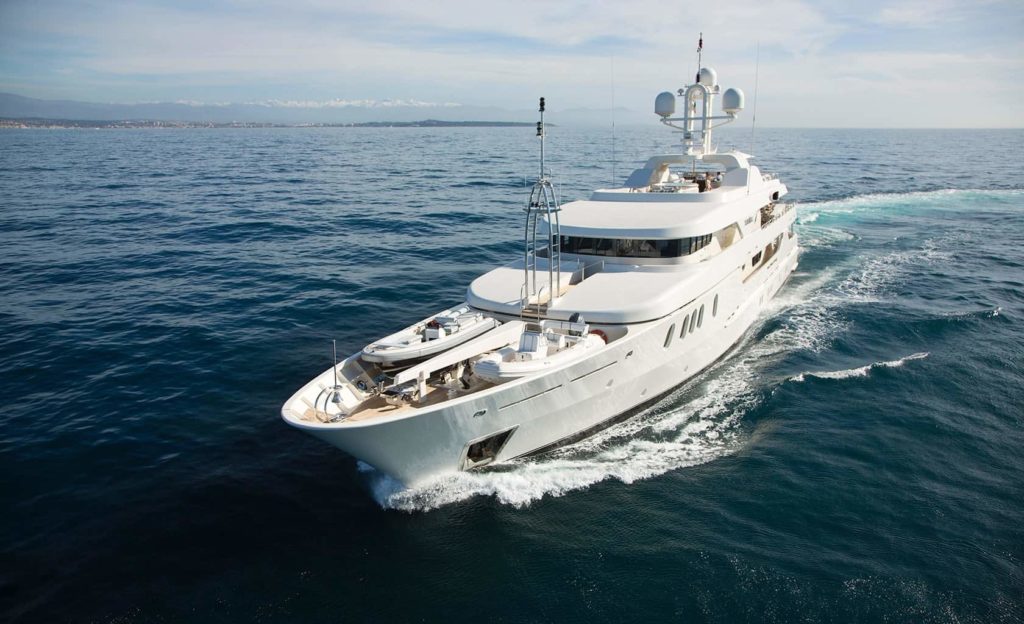
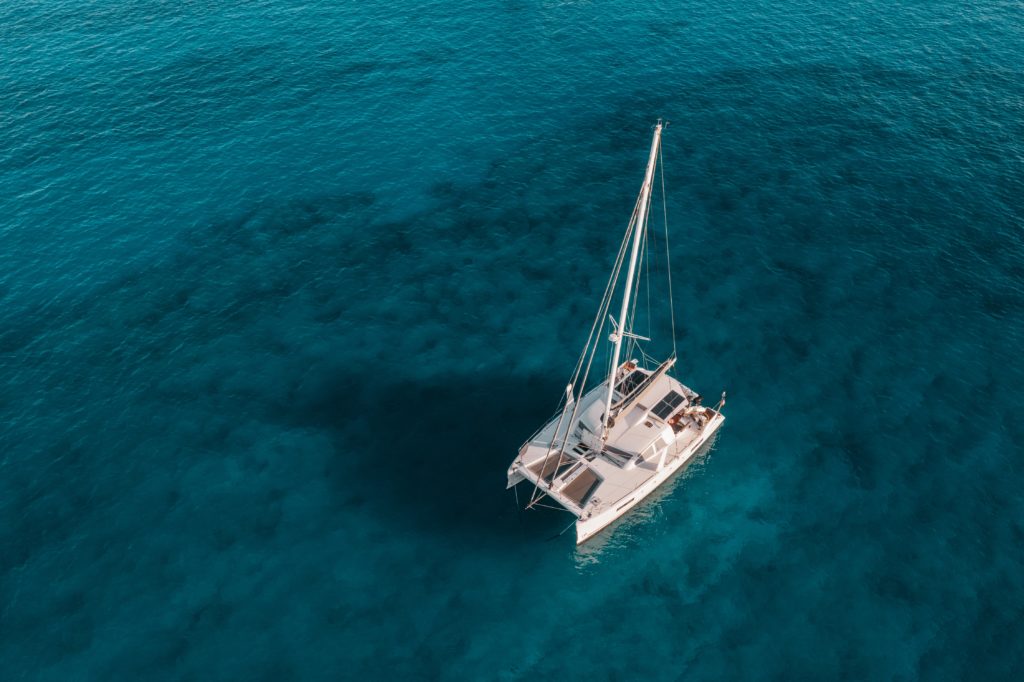
The smallest crewed yachts may only have a captain, or a captain and a steward. But as yachts get larger and more complex, it takes more people to keep them running efficiently.
Bigger yachts mean more and bigger jobs
Polishing the inside and outside of a hundred-foot yacht is a lot more work than polishing a seventy-five footer. It’s not just the length. As boats get longer, they also increase in beam and volume.
Every job gets bigger, not just the cleaning and shining. Engines are larger, systems are more complex, and there’s often more of them. There will be more launches and water toys, more dishes to clean and beds to change.
Large yachts usually have more guests
It takes more stewards and deck crew to support more guests on board. To maintain a top level of service, you’re going to need more stewards, chefs, deckhands, and housekeepers to keep those standards.
More crew space and rooms for big yachts
Because of the larger crew needs, you will need more dedicated crew space on larger yachts. While small yachts may get by with just a cabin or two with bunks, when the crew gets over a certain size living space needs more. Larger yachts may have a crew galley, more sleeping accommodations, and a lounge area for crew to spend off duty time.
Do you need more staff on a sail or motor yacht?
Sailing crew needs more seamanship skills, but that doesn’t mean you need more of them. But some functions are different. Sailing yachts usually travel further, but the crew roles and presentation are often less formal and demanding. Of course, it depends on the owner’s preference.
When comparing a sail and motor yacht of the same length, sailing yachts have a much smaller capacity for passengers and equipment. Sailing yachts are slimmer than motor yachts and have fewer decks and less space above the waterline. So there is less living space for guests, simpler machinery, and fewer toys on board. That’s not to say they’re spartan or bare, but foot-per-foot, you need more crew to support the larger capabilities of a motor yacht.
What sized staff for your yacht by size?
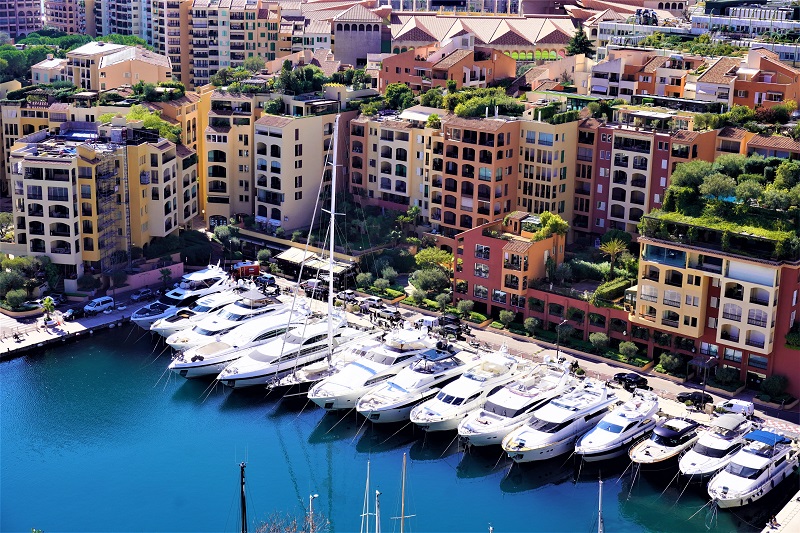
An exact number per foot is, of course, impossible. Crew size varies by the number of passengers, the complexity of the yacht, and the owner’s demands. But we can give you some rough rules of thumb.
Yachts smaller than 75 feet (25 meters) often need only a captain
You may also want a cook/steward to go with a yacht that size if you won’t be filling those roles for yourself and your guests. There are many working couples on smaller yachts who team up in these jobs.
Yachts from 75 feet to 100 feet usually need up to eight staff in total
Much depends on the systems on the boat and the number of passengers. More passenger berths means more stewards and deck hands.
Yachts 100 feet to 200 feet may need up to twenty
Over one hundred feet, you often add a full timer purser, and the interior crew splits into housekeeping and steward divisions. And you need department heads and more engineers and bridge crew.
Over 200 feet you may need from twenty up to fifty crew on the largest yachts
All department sizes grow, and specialized jobs are broken out. The largest yachts have the most specialized staff. You may have everything from sommeliers, specialist engineers, and more hands, stewards, and bridge officers.
Read also: The yacht charter experience ladder
How can you find staff?
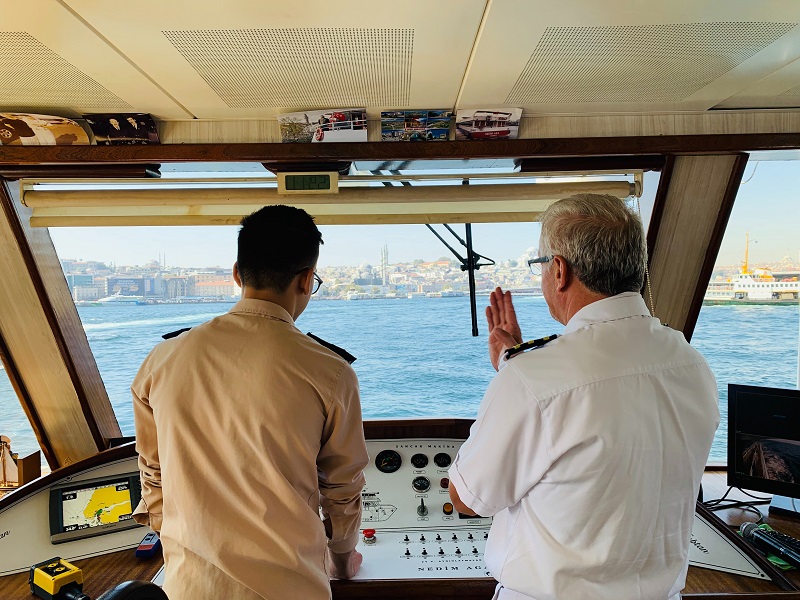
Finding all the crew for a large yacht is an enormous job, and takes a lot of time and resources to locate, interview, screen and hire everyone you need. The good news is that you, as the yacht owner, don’t have to do all that.
In fact, it’s better in some ways if you don’t get involved in all the hiring decisions. As the owner, of course you have the final say in any crew hiring decision, but your captain and department heads are the ones who will manage the crew daily. And they’re the best qualified to know who to bring on board.
So don’t expect to spend your time reviewing stacks of resumes or answering ads – that’s for your captain and department heads to figure out. But you should meet crew, and you certainly should advise if there are any crew members you have strong opinions about to the positive or negative. They work for you, take care of you, and must meet your wants and needs, after all.
Find the captain and the head chef first
The first order of business is to find your captain. If you’re starting from scratch with an empty yacht, hiring anyone else first can be a big mistake. A good captain will know how to hire department heads, and will be involved with all hiring decisions and interviews for you.
The head chef is the other difficult but critical spot to fill. The chef sets the tone for all the entertaining on the yacht. Everything from the types and styles of cuisines to the wine lists and menus they can come up with in remote locations with local fresh goods is on them.
It’s important that you are very compatible with your head chef, because the galley staff will provide all the food for you and your guests on board. The galley can make or break your yachting experience, so you want someone who prepares varied cuisine that excites you.
Advertise the jobs and look at resumes
Once you’ve hired your key personnel, you can advertise for crew on crew job finders and web sites. Or more accurately, your captain can start the search, because he or she will be the one conducting the bulk of the recruiting. There are also job finder sites for crew where prospects looking for a change can put their resumes out.
Be careful not to flood the market with too many ads, because you may find you get a lot of unqualified applications.
Check out referrals
Referrals are one of the most powerful recruitment tools. If you have crew members you know, like, and trust, it’s guaranteed that they know other crew on other yachts they’ve worked on. Candidates known personally by your captain and crew are a much more likely fit, and easier to screen. Especially if they’re worked together before and are not just friends.
If you’re looking to fill one or two spots, have your captain ask around or even offer an incentive to refer new recruits.
Use the services of a recruitment agency
A professional recruitment agency is by far the easiest and safest way to hire a crew. They carefully screen applicants and only present quality candidates for your captain to meet. It saves a lot of time, and in the end can save you money despite the placement fees, because replacing a crew member is always expensive. And a bad hire costs as much to find and train as a good one.
If you go with an agency, pick a reputable one, and work only with one. You don’t want lots of unqualified agencies flooding the market with your jobs. The duplicate postings can turn your job search into a free-for-all with agencies vying for a placement. You may get swamped with unqualified candidates from unprincipled agents just looking to get lucky.
So pick a reputable agency, and work out an exclusive arrangement to keep the process in check.
Let your yacht broker / charter agent handle it
Another alternative is to let the brokerage who sold you the yacht do the first round of hires for you. They want you to be happy, and they have many contacts in the industry.
If your yacht is under charter management, you can also get the management company to staff the yacht for you.
No matter what, you should be very involved in selecting the captain and chef. But the management company can hire the rest with less direct involvement as they work with the captain you choose.
How do you know who to hire?
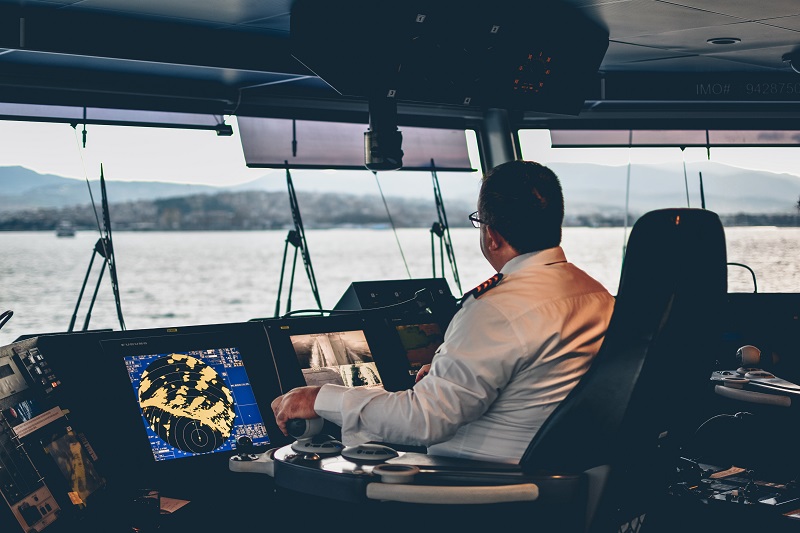
There are many people drawn to the crew life, and you and your captain will get a lot of resumes and applications for most jobs you’re filling. Picking a good fit for skills, experience and a personality that works with your existing crew is the challenge.
Experience

Experienced crew is always preferred, but everyone has to start somewhere. When you evaluate a candidate, look for relevant experience in a situation similar to yours.
Crew with no yacht experience should have related service industry or engineering experience. Stewards who have worked in high end hotels understand the service level you expect, as do cooks and chefs with fine dining experience.
Some deck hands and interior crew will come to you with no experience at all. But with the right attitude and good aptitude, they can fill an entry level position and grow into bigger things.
Certifications, Training and Ratings
Your crew needs to have the STCW (Standards of Training, Certification and Watch-keeping for Seafarers) certificate and an ENG1 (Seafarer Medical Certificate). The former is a skills course and test on the basics of safe yacht operations, the latter is a medical certification of good health, to lower risk of medical emergencies in remote places. Any serious candidate – even an inexperienced junior crew member, should have made these investments in themselves before applying to your yacht.
Beyond the minimums, look for skill-specific and industry training.
For engineering, it’s pretty easy, as engineering ratings are tightly regulated and spell out exactly what an engineer is trained and qualified to handle. They may have done more in their career, but the ratings spell out their training level.
Head and assistant chefs should have formal training from accredited gastronomy and culinary programs. Lower-level cooks may work from experience only, but your top chef needs real training.
Interior staff and deck crew certification and training are a bit more open-ended and less formal. Applicants who have taken relevant course work in hospitality and marine topics should let you know on their resumes.
References
Always check references. The references are one of the best ways to ensure that an applicant is who they claim, and actually did the work on their resume. Check every reference, to verify not only employment but responsibilities. You don’t want to hire a bosun only to discover that he was really a deckhand at his last job and just talked a good game.
The best references are through people you know an applicant worked with, whether or not they supplied the reference. So if you or your captain know someone on a yacht they’ve claimed to work on, reach out and ask about them.
Personality
Figuring out if a crew member fits in your existing team is one of the most vexing problems in any industry. Managers have tried everything from formal personality tests to bizarre interview scenarios. It’s not a simple thing to quantify, and every personality you add to your staff changes the total crew just a little. You want those changes for the better.
It’s hard to nail down, and you’re going to rely on your captain and department heads to figure out how an applicant may fit in.
Watch out for red flags
There are a few red flags that can tip you off that there are some problems with a candidate. A few things to look out for include:
Additional advice from our experience


We’ve been around yachts and yacht crews for a while, and there are a few more things we think you should know.
Ensure your captain and head chef get along
The galley crew feeds everyone on board and sets a lot of tone for the experience on the yacht. It’s important that the head chef works very well with the captain. This works both ways, because sometimes the needs of the yacht outweigh the requirements of the chef. But in the other direction, if the chef doesn’t have access to what they need to set a world-class table, no one will be happy.
Try to find a crew that matches your personality and needs
Some yacht owners are very formal and just want the crew to fade in the background when their service is done. And other owners are casual, and will enjoy a more personal relationship with the crew, knowing their names and a bit about them and include them in some fun.
You need to hire a crew that fits your personality wherever you fall on that scale. If you’re relaxed and you have a chief steward who won’t ease up, or if you want formality and they’re flopping down in a chair next to you to chat about what you want…either is a problem.
How you want your yacht to run and the relationship you want with your crew is the first rule of happiness for everyone.
Avoid staffing your yacht yourself your first time
It’s your first go, and it’s a lot of work with a lot of complicated dynamics. It’s best to defer to the experts until you’re really comfortable with what you want from the crew. Use an agency to get an excellent captain, then work with the captain and the agency both to bring in department heads. They can hire the rest, but don’t do it all yourself. You want to be enjoying your yacht, not interviewing rookie deckhands.
Good crew agreements are a key to success
More accurately, good communication of expectations to crew is the key to success. And a crew agreement spells out clearly what you expect of your crew, and what your crew can expect of you as the yacht owner. Vague words can lead to misunderstandings, and misunderstandings lead to conflicts.
Yacht’ Staff : Frequently Asked Questions


The captain and head chef take the most time and care to find. These two positions are crucial to the success of your crew, and they’re also the most sought after and in demand. The wrong captain will never get you the right crew.
The answer depends both on the size of your yacht and the service level you’re aiming for. More passengers on board usually means more stewards, deckhands, and cooks. A bigger yacht needs more of everything, including engineers and bridge crew. A higher level of service adds more stewards, deckhands and cooks.
There’s no hard and fast rule, but your crew may easily consume from a quarter to half or more of your operating budget.
There are a few rules that hold true in staffing, however.
Read also: RENT TO OWN YACHTS: SHOULD YOU DO IT? BOAT LEASING EXPLAINED
A happy crew keeps YOU happy
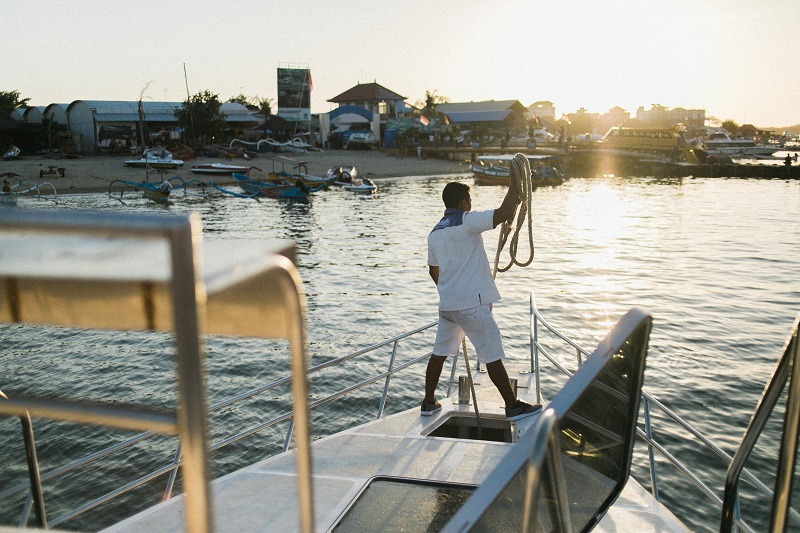
Keeping a good crew is the best way to make sure you don’t have to waste a lot of time and money hiring new crew! And if you’re happy with your crew, you don’t want change and upheaval.
Unless they’re looking for a change in life away from yachting, if you keep your crew happy, they should stick around and serve loyally for years.
Consider a few things you and your captain can do to keep your crew content and eager to get back on board after breaks.
Remember, you bought your yacht for your pleasure. A good crew is integral to that, and will enhance your enjoyment and experience. So spend the time and money to hire well, and keep a good crew together once you have it.




